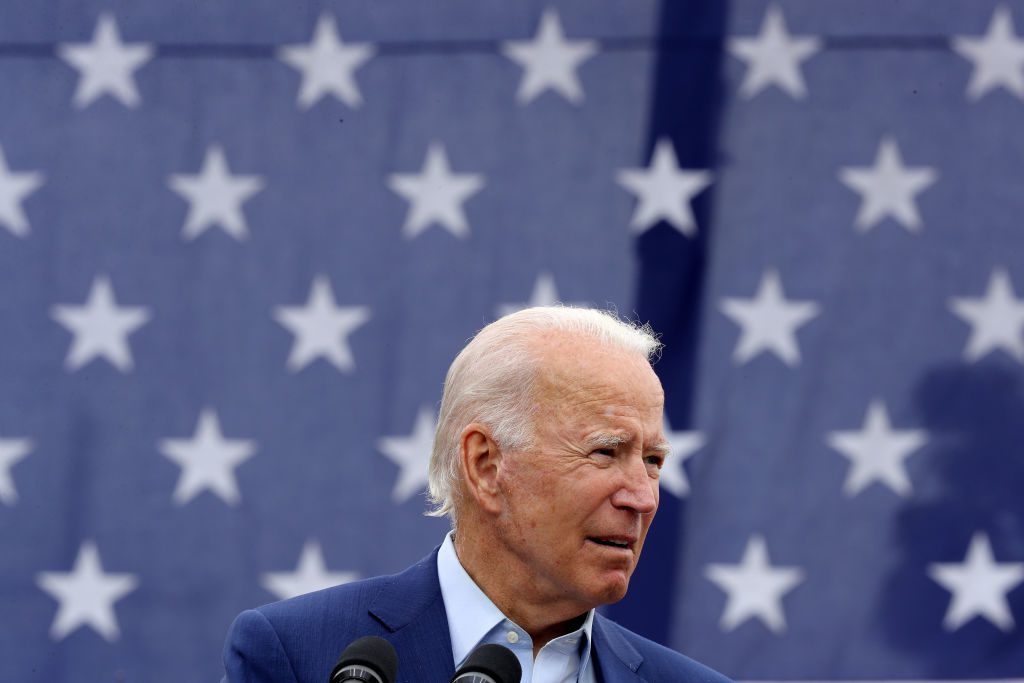The Democrats’ Great Surrender on Foreign Policy

The battle is on for the foreign policy soul of the Democratic Party, or at least it was on. Stars and Stripes reported yesterday that Joe Biden has reiterated that he’ll leave a troop contingent in the Middle East, even while claiming he wants to bring the “forever wars” to a close. Biden also acknowledged that he doesn’t envisage serious cuts to the defense budget, preferring to redirect the military’s efforts towards larger threats like Russia and China.
That sounds an awful lot like the “pivot to Asia” that Biden failed to help accomplish the last time he held executive office. It’s also yet another slap in the face to what remains of the principled progressive left, which still broadly supports bringing the troops home. And perhaps we shouldn’t be surprised. Given Biden’s history, given the Grima Wormtongue-like presence of liberal interventionists like Susan Rice and Samantha Power, given the various threats at the convention to impale Vladimir Putin on a flagpole, given the total sidelining of Tulsi Gabbard, it seems the Democratic Party has made its choice.
For a glimpse into this mindset, consider a recent op-ed at Bloomberg by James Stavridis. Stavridis is an accomplished military man and scholar, a retired admiral and former supreme allied commander of NATO; he was also listed as a potential veep for Hillary Clinton in 2016. And he is very worried about Donald Trump’s proposed troop withdrawal from Iraq. He writes:
It will first and foremost embolden the Islamic State. The American presence has been the glue holding together the coalition against ISIS, largely through non-combat functions such as logistics, medical care and intelligence-gathering. While a full-blown ISIS resurgence seems unlikely right now — at least in part because the Syrian regime of Bashar al-Assad has boosted its military presence on its side of the border with Iraq — we still must be mindful that the remaining embers could reignite.
It’s worth remembering that hawks spent years insisting Assad and the Islamic State were not really in opposition, that you could get rid of the former without availing the latter. Yet now Assad is (rightly) being given credit for helping cool the ISIS presence in Iraq. That ISIS presence is sustained by a number of factors: the instability of the Iraqi government, widespread corruption and extortion, deep-rooted underground networks, the coronavirus, poverty. These problems are systemic and protracted; there isn’t much even a substantial American troop presence could do about them, as the George W. Bush years well proved. If we stay until they’re resolved, until all of Stavridis’ “embers” are snuffed out, we’re going to be in Iraq forever.
Stavridis again:
Second, a U.S. departure will be celebrated in Tehran. The Iranians will rightly see this as America walking away from the region it did so much to destabilize. …And it will give Iranian leaders a strong talking point about how they are (finally) pushing the Americans out of the region. And what helps Iran also helps its allies, Russia and Syria — America’s other implacable foes in the region.
Says who? When was it decided that Iran, Russia, and Syria were our “implacable foes”? Did Congress debate this? Was there input from the public? Might it not be a trifle dangerous to use the language of friends and foes against Russia, a nuclear-armed power, over tracts of desert where we have little national interest to speak of? And who cares what the Iranians would think of an American withdrawal? What could constitute a greater surrender to Tehran than allowing their gloating to dictate our foreign policy?
Stavridis sums up the Trump withdrawal this way:
Winners: Islamic State, Iran, Russia and Syria. Losers: America’s allies. And, of course, the people of Iraq, who will slip further under Iranian control. All with no significant savings in money or lives.
This assumes the Iraqi people have no autonomy of their own, that they’re just chum in the tides stirred up by greater powers. But those same Iraqis are currently demonstrating in the streets against Iranian (and American) influence over their politics, which has genuinely weakened Tehran’s position in Iraq. And if we’re going to invoke the people of Iraq, then we might consider the stated will of their elected representatives. After the Soleimani assassination back in January, the Iraqi parliament voted for our troops to leave.
What’s striking about Stavridis’ arguments isn’t that they’re novel; it’s that they’re the same lines hawks have have been mouthing for years, battle-tested during the Syria debate and persisting ever since. Now the latest Democratic ticket has internalized them, same as the last Democratic ticket. Whether Trump’s cynical, eleventh-hour, politically motivated withdrawals will bring the troops home is an open question; whether Biden will is an on-the-record no.